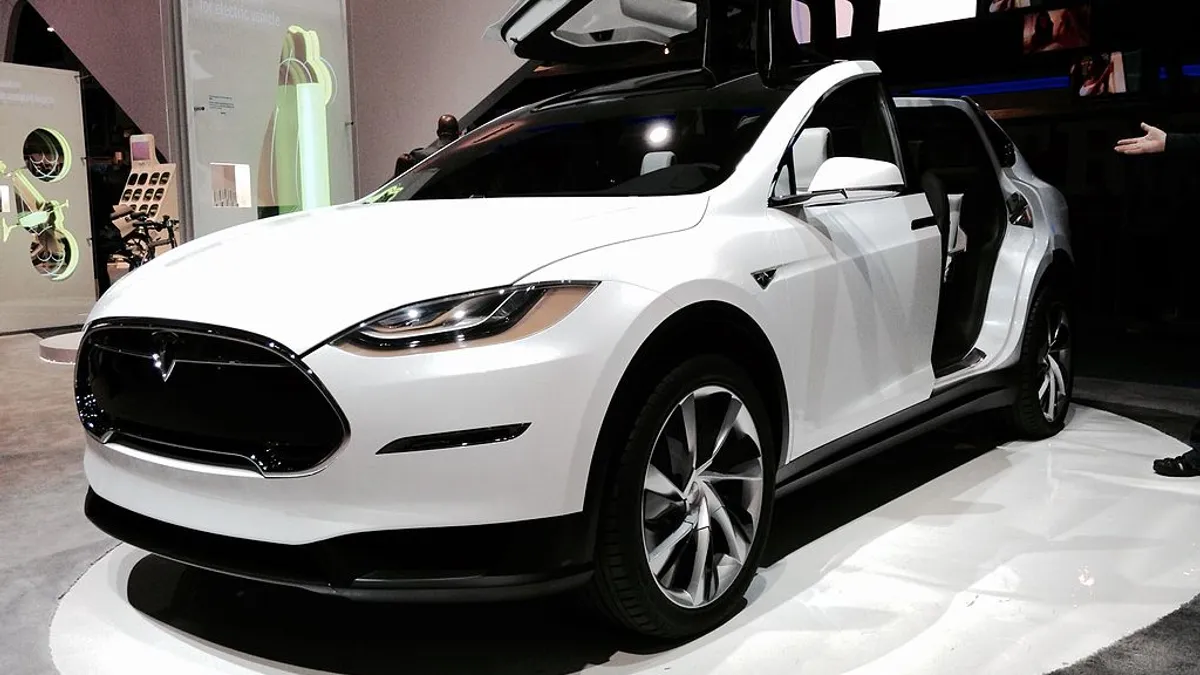Dive Brief:
- Tesla has filed a lawsuit alleging that EV startup Rivian Automotive persuaded employees recruited from Tesla to provide Rivian with Tesla's trade secret information. Tesla filed the suit July 17 against Rivian and several former employees in the Superior Court of California for Santa Clara County.
- Rivian has secured nearly $6 billion in financing before producing a single vehicle, Sam Abuelsamid, principal research analyst with Guidehouse Insights, told Utility Dive. Rivian rose to prominence last September when it secured a contract from Amazon for 100,000 delivery vans to be built on Rivian’s flexible “Skateboard” chassis.
- “The idea of a booming EV market keeps being promised, but never materializes,” Brian Moody, executive editor of Autotrader, told Utility Dive in an email. The legacy automakers “who have already been designing, building, marketing, selling and servicing automobiles for many, many years” are best positioned “to capitalize on a slow-growing EV market,” Moody said.
Dive Insight:
Tesla alleges that Rivian asked employees to misappropriate specific confidential information before leaving Tesla, according to the company’s filing in state court.
"This suit’s allegations are baseless and run counter to Rivian's culture, ethos, and corporate policies," Rivian said in a statement. "Upon joining Rivian, we require all employees to confirm that they have not, and will not, introduce former employers' intellectual property into Rivian systems."
The allegations come as companies increasingly jockey for dominance in the growing EV market. Tesla may be well positioned in the EV market now, but the competitive landscape can change rapidly.
“Tesla deserves credit for teaching consumers and automakers that an electric car can also be a luxury car,” Autotrader's Moody said. However, being first does not guarantee future market dominance, he continued, pointing to the fates of the Sony Walkman, Blockbuster Video, and Kodak film. Moody expects to see a gradual electrification of passenger cars over the course of years or decades.
Vehicles with internal combustion engines will continue to dominate the automotive market through 2030, possibly even 2040, Stephanie Brinley, principal automotive analyst for IHS Markit told Utility Dive.
EVs represented only 2% on the U.S. light vehicle market last year, Brinley noted. “Our IHS Markit forecast expects EVs to be about 8% of the U.S. light-vehicle market in 2025,” she said.
“The internal combustion engine has been the dominant propulsion source for 100 years,” Brinley said, “There’s a long way to go, and a lot of opportunities, in developing electric propulsion systems.”
Legacy automakers like Ford, General Motors, Renault-Nissan and Volkswagen have the advantage of substantial revenues from existing vehicle sales, according to Brinley. Startups don’t have to retrofit existing manufacturing facilities and aren’t tied to existing dealership networks. But startups must build up their manufacturing resources, design their vehicles, and create a network of retail stores or dealership franchises to sell their vehicles, she said.
Guidehouse’s Abuelsamid foresees a faster transition to electrification, predicting that EVs will achieve parity with internal combustion engine vehicles between 2023 and 2025. That transition will not be without challenges.
“There’s no proven customer demand yet for electric vehicles,” he said. EV sales so far have been driven by government incentives, especially in the United States. Even with government incentives, upfront costs for EVs remain higher than for comparable diesel and gasoline models, he said. Vehicle charging is still difficult, especially for drivers without a garage or driveway in front of a single-family home.
Tesla is the established EV market leader, according to Abuelsamid. But Guidehouse Insights ranked Rivian, NIO, and heavy-duty fuel cell vehicle maker Nikola as the leading EV upstarts in a recent report.
“Getting into the automotive market has always been an extremely challenging, capital-intensive business,” he told Utility Dive. The financing that Rivian has secured gives it an advantage over other upstarts as does its decision to begin production with a pick-up truck and SUV, which have both high demand and high margins.
But it’s too soon to call the winners and losers in EV manufacturing, Brinley said.













